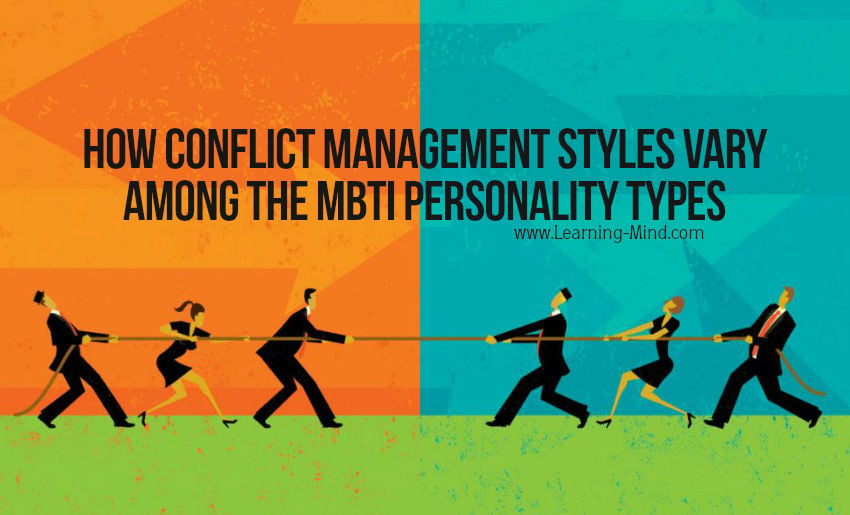
According to Thomas, K.W., and R.H. Kilmann, there are five conflict management styles:
Accommodating and collaborating are the two most cooperative conflict management styles. Competing and avoiding are the uncooperative styles. Competing and collaborating are considered to be the more assertive conflict management styles. Avoiding and accommodating are not. As you would expect, compromising is in the middle of cooperating and assertiveness.
Now we come onto personality types. The Myers-Briggs Type Indicator (Personality Test) is based on a person choosing between a set of two indicators. This leads to a four-letter personality type. All four letters are important in determining a person’s character. The last two letters are called the ‘conflict pairs’.
These are the ‘Feeling/Thinking’ preferences and the ‘Judging/Perceiving’ preferences. It is between these two pairs that the greatest areas of conflict lie.
When a person is dealing with a conflict they are most likely to use their thinking or feeling part of their personality at the beginning.
People who are thinkers generally prefer to look at the facts of an argument, the evidence and the logical explanation. Feelers do the opposite and are more concerned with the emotions or any special circumstances surrounding the conflict.
You can see how two people with these different conflict management styles would find it very difficult to come to an agreement. The thinking person would want stone, cold facts and the feeler would be soaking up the emotions.
When a person is trying to resolve a conflict, they are most likely to turn to their judging or perceiving sides of their personality.
People choosing the judging indicator tend to want to get things decided so that they can get on with their structured life. Perceivers are much more interested in focusing on the conflict itself and how it is impacting on others. They want to see solutions, not just a resolution.
These two conflict management styles are, again, very different and could easily cause problems within the conflict itself.
Now, it’s time to look at each MBTI personality type in more detail and their conflict management styles:
ISTJ’s are practical and logical types who will want to see an outcome to any conflict.
People with ISFJ personality will want a harmonious environment, so they will do anything to resolve conflict.
The INFJ personality type wants to understand people and how to get the best out of a situation so conflict is an anathema to them.
The INTJ personality type can be quite sceptical and have high standards, so it could be hard for them to resolve conflicts.
ISTP’s are tolerant and flexible and will use facts, not feelings, when it comes to managing conflict.
ISFP’s are sensitive types who dislike disagreements and conflicts and will not want to force their opinions on others.
The INFP personality type is the most adaptable of the personality types and will try everything to resolve a conflict. They will see possibilities where others can’t.
The INTP personality type will use logic and facts to solve problems but is not great dealing with people.
ESTP’s are far too energetic and busy to let someone else sort out conflicts. They’ll do it themselves, but facts will bore them.
A friendly type that is full of common sense. A good mediator in fact.
Quick-thinking and able to see all possibilities makes ENFP’s almost unbeatable in conflicts.
ENTP’s are amazing at finding ingenuous solutions to conflicts, but they do want to solve problems quickly.
ESTJ’s are practical, realistic and decisive and will be forceful in their handling of conflict.
ESFJ’s are warm-hearted types and very cooperative. They’ll want to maintain good relations after the conflict is resolved.
ENFJ’s are very attuned to others’ needs, so they may avoid conflict to help others fulfil their potential.
ENTJ’s are decisive and quick to assume the leadership role in a conflict. They will want the facts and then make a quick decision.
If you know your own MBTI personality type, you can see your corresponding conflict pairs. So, whenever you are faced with conflict, you’ll have an idea of how you’ll respond. Even better, if you know the personality types of those around you, it might be possible to predict how they’ll react too.
No matter what conflict management style you do end up using, there are guidelines when it comes to dealing with conflict:
Everyone has a different conflict management style. Knowing what it is and how to acknowledge it will enable all parties to work through it and move on.
References: